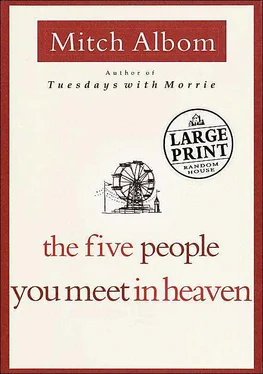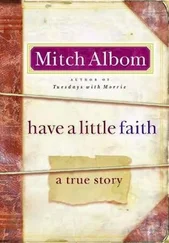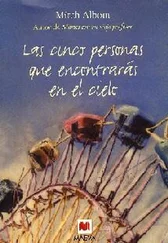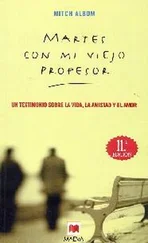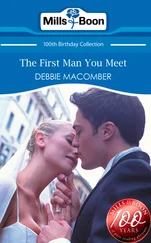Where am I now? Eddie thought. Once again, he took stock of his body, pressing on his shoulders, his chest, his stomach. His arm muscles remained tight, but his midsection was looser, flabbier. He hesitated, then squeezed his left knee. It throbbed in pain and Eddie winced. He had hoped upon leaving the Captain that the wound would disappear. Instead, it seemed he was becoming the man he’d been on earth, scars and fat and all. Why would heaven make you relive your own decay?
He followed the flickering lights down the narrow ridge. This landscape, stark and silent, was breathtaking, more like how he’d imagined heaven. He wondered, for a moment, if he had somehow finished, if the Captain had been wrong, if there were no more people to meet. He came through the snow around a rock ledge to the large clearing from which the lights originated. He blinked again—this time in disbelief.
There, in the snowy field, sitting by itself, was a boxcar-shaped building with a stainless steel exterior and a red barrel roof. A sign above it blinked the word: “ EAT. ”
A diner.
Eddie had spent many hours in places like this. They all looked the same—high-backed booths, shiny countertops, a row of small-parted windows across the front, which, from the outside, made customers appear like riders in a railroad car. Eddie could make out figures through those windows now, people talking and gesturing. He walked up the snowy steps to the double-paned door. He peered inside.
An elderly couple was sitting to his right, eating pie; they took no notice of him. Other customers sat in swivel chairs at the marble counter or inside booths with their coats on hooks. They appeared to be from different decades: Eddie saw a woman with a 1930s high-collared dress and a longhaired young man with a 1960s peace sign tattooed on his arm. Many of the patrons appeared to have been wounded. A black man in a work shirt was missing an arm. A teenage girl had a deep gash across her face. None of them looked over when Eddie rapped on the window. He saw cooks wearing white paper hats, and plates of steaming food on the counter awaiting serving—food in the most succulent colors: deep red sauces, yellow butter creams. His eyes moved along to the last booth in the right-hand corner. He froze.
What he saw, he could not have seen.
No,” he heard himself whisper. He turned back from the door. He drew deep breaths. His heart pounded. He spun around and looked again, then banged wildly on the windowpanes.
“No!” Eddie yelled. “No! No!” He banged until he was sure the glass would break. “No!” He kept yelling until the word he wanted, a word he hadn’t spoken in decades, finally formed in his throat. He screamed that word then—he screamed it so loudly that his head throbbed. But the figure inside the booth remained hunched over, oblivious, one hand resting on the table, the other holding a cigar, never looking up, no matter how many times Eddie howled it, over and over again: “Dad! Dad! Dad!”
Today Is Eddie’s Birthday
In the dim and sterile hallway of the V.A. hospital, Eddie’s mother opens the white bakery box and rearranges the candles on the cake, making them even, 12 on one side, 12 on the other. The rest of them—Eddie’s father, Joe, Marguerite, Mickey Shea—stand around her, watching.
“Does anyone have a match?” she whispers.
They pat their pockets. Mickey fishes a pack from his jacket, dropping two loose cigarettes on the floor. Eddie’s mother lights the candles. An elevator pings down the hall. A gurney emerges.
“All right then, lets go,” she says.
The small flames wiggle as they move together. The group enters Eddies room singing softly. “Happy birthday to you, happy birthday to—“
The soldier in the next bed wakes up yelling, “WHAT THE HELL?” He realizes where he is and drops back down, embarrassed. The song, once interrupted, seems too heavy to lift again, and only Eddie’s mother’s voice, shaking in its solitude, is able to continue.
“Happy birthday dear Ed-die …” then quickly, “happybirth-day to you.”
Eddie props himself against a pillow. His burns are bandaged. His leg is in a long cast. There is a pair of crutches by the bed. He looks at these faces and he is consumed by a desire to run away.
Joe clears his throat. “Well, hey, you look, pretty good,” he says. The others quickly agree. Good. Yes. Very good.
“Your mom got a cake,” Marguerite whispers.
Eddie’s mother steps forward, as if it’s her turn. She presents the cardboard box.
Eddie mumbles, “Thanks, Ma.”
She looks around. “Now where should we put this?”
Mickey grabs a chair. Joe clears a small tabletop. Marguerite moves Eddie’s crutches. Only his father does not shuffle for the sake of shuffling. He stands against the back wall, a jacket over his arm, staring at Eddie s leg, encased in plaster from thigh to ankle.
Eddie catches his eye. His father looks down and runs his hand over the windowsill. Eddie tightens every muscle in his body and attempts, by sheer will, to force the tears back into their ducts.
All parents damage their children. It cannot be helped. Youth, like pristine glass, absorbs the prints of its handlers. Some parents smudge, others crack, a few shatter childhoods completely into jagged little pieces, beyond repair.
The damage done by Eddie’s father was, at the beginning, the damage of neglect. As an infant, Eddie was rarely held by the man, and as a child, he was mostly grabbed by the arm, less with love than with annoyance. Eddie’s mother handed out the tenderness; his father was there for the discipline.
On Saturdays, Eddie’s father took him to the pier. Eddie would leave the apartment with visions of carousels and globs of cotton candy, but after an hour or so, his father would find a familiar face and say, “Watch the kid for me, will ya?” Until his father returned, usually late in the afternoon, often drunk, Eddie stayed in the custody of an acrobat or an animal trainer.
Still, for countless hours of his boardwalk youth, Eddie waited for his father’s attention, sitting on railings or squatting in his short pants atop tool chests in the repair shop. Often he’d say, “I can help, I can help!” but the only job entrusted him was crawling beneath the Ferris wheel in the morning, before the park opened, to collect the coins that had fallen from customers’ pockets the night before.
At least four evenings a week, his father played cards. The table had money, bottles., cigarettes, and rules. Eddie’s rule was simple: Do not disturb. Once he tried to stand next to his father and look at his cards, but the old man put down his cigar and erupted like thunder, smacking Eddie’s face with the back of his hand. “Stop breathing on me,” he said. Eddie burst into tears and his mother pulled him to her waist, glaring at her husband. Eddie never got that close again.
Other nights, when the cards went bad and the bottles had been emptied and his mother was already asleep, his father brought his thunder into Eddie and Joe’s bedroom. He raked through the meager toys, hurling them against the wall. Then he made his sons lie facedown on the mattress while he pulled off his belt and lashed their rear ends, screaming that they were wasting his money on junk. Eddie used to pray for his mother to wake up, but even the times she did, his father warned her to “stay out of it.” Seeing her in the hallway, clutching her robe, as helpless as he was, made it all even worse.
The hands on Eddie’s childhood glass then were hard and calloused and red with anger, and he went through his younger years whacked, lashed, and beaten. This was the second damage done, the one after neglect. The damage of violence. It got so that Eddie could tell by the thump of the footsteps coming down the hall how hard he was going to get it.
Читать дальше
